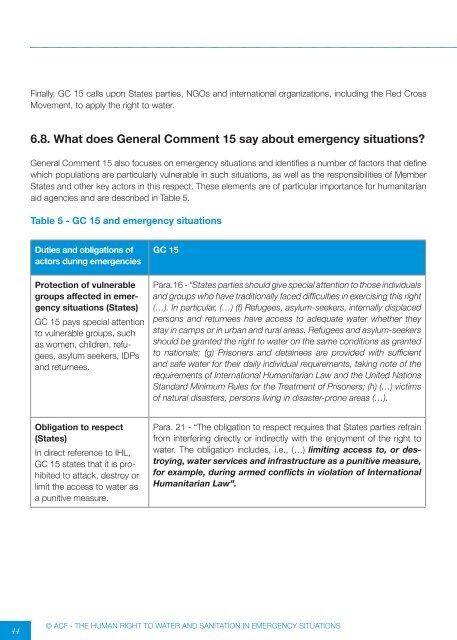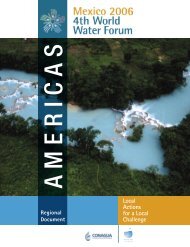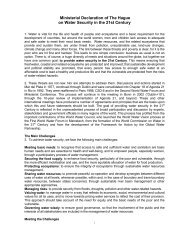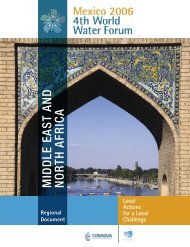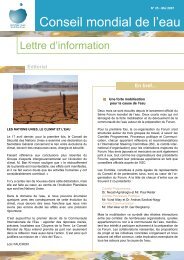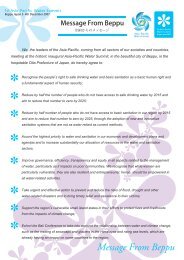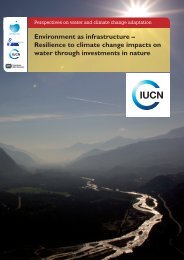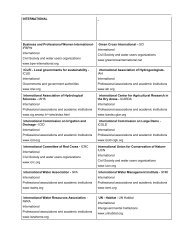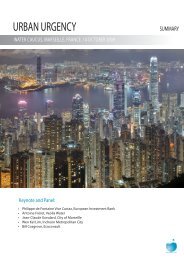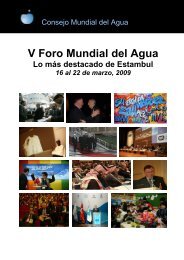the human right to water and sanitation in emergency situations
the human right to water and sanitation in emergency situations
the human right to water and sanitation in emergency situations
Create successful ePaper yourself
Turn your PDF publications into a flip-book with our unique Google optimized e-Paper software.
44<br />
F<strong>in</strong>ally, GC 15 calls upon States parties, NGOs <strong>and</strong> <strong>in</strong>ternational organizations, <strong>in</strong>clud<strong>in</strong>g <strong>the</strong> Red Cross<br />
Movement, <strong>to</strong> apply <strong>the</strong> <strong>right</strong> <strong>to</strong> <strong>water</strong>.<br />
6.8. What does General Comment 15 say about <strong>emergency</strong> <strong>situations</strong>?<br />
General Comment 15 also focuses on <strong>emergency</strong> <strong>situations</strong> <strong>and</strong> identifies a number of fac<strong>to</strong>rs that def<strong>in</strong>e<br />
which populations are particularly vulnerable <strong>in</strong> such <strong>situations</strong>, as well as <strong>the</strong> responsibilities of Member<br />
States <strong>and</strong> o<strong>the</strong>r key ac<strong>to</strong>rs <strong>in</strong> this respect. These elements are of particular importance for <strong>human</strong>itarian<br />
aid agencies <strong>and</strong> are described <strong>in</strong> Table 5.<br />
Table 5 - GC 15 <strong>and</strong> <strong>emergency</strong> <strong>situations</strong><br />
Duties <strong>and</strong> obligations of<br />
ac<strong>to</strong>rs dur<strong>in</strong>g emergencies<br />
Protection of vulnerable<br />
groups affected <strong>in</strong> <strong>emergency</strong><br />
<strong>situations</strong> (States)<br />
GC 15 pays special attention<br />
<strong>to</strong> vulnerable groups, such<br />
as women, children, refugees,<br />
asylum seekers, IDPs<br />
<strong>and</strong> returnees.<br />
obligation <strong>to</strong> respect<br />
(States)<br />
In direct reference <strong>to</strong> IHL,<br />
GC 15 states that it is prohibited<br />
<strong>to</strong> attack, destroy or<br />
limit <strong>the</strong> access <strong>to</strong> <strong>water</strong> as<br />
a punitive measure.<br />
GC 15<br />
Para.16 - “States parties should give special attention <strong>to</strong> those <strong>in</strong>dividuals<br />
<strong>and</strong> groups who have traditionally faced difficulties <strong>in</strong> exercis<strong>in</strong>g this <strong>right</strong><br />
(…). In particular, (…) (f) Refugees, asylum-seekers, <strong>in</strong>ternally displaced<br />
persons <strong>and</strong> returnees have access <strong>to</strong> adequate <strong>water</strong> whe<strong>the</strong>r <strong>the</strong>y<br />
stay <strong>in</strong> camps or <strong>in</strong> urban <strong>and</strong> rural areas. Refugees <strong>and</strong> asylum-seekers<br />
should be granted <strong>the</strong> <strong>right</strong> <strong>to</strong> <strong>water</strong> on <strong>the</strong> same conditions as granted<br />
<strong>to</strong> nationals; (g) Prisoners <strong>and</strong> deta<strong>in</strong>ees are provided with sufficient<br />
<strong>and</strong> safe <strong>water</strong> for <strong>the</strong>ir daily <strong>in</strong>dividual requirements, tak<strong>in</strong>g note of <strong>the</strong><br />
requirements of International Humanitarian Law <strong>and</strong> <strong>the</strong> United Nations<br />
St<strong>and</strong>ard M<strong>in</strong>imum Rules for <strong>the</strong> Treatment of Prisoners; (h) (…) victims<br />
of natural disasters, persons liv<strong>in</strong>g <strong>in</strong> disaster-prone areas (…).<br />
Para. 21 - “The obligation <strong>to</strong> respect requires that States parties refra<strong>in</strong><br />
from <strong>in</strong>terfer<strong>in</strong>g directly or <strong>in</strong>directly with <strong>the</strong> enjoyment of <strong>the</strong> <strong>right</strong> <strong>to</strong><br />
<strong>water</strong>. The obligation <strong>in</strong>cludes, i.e., (…) limit<strong>in</strong>g access <strong>to</strong>, or destroy<strong>in</strong>g,<br />
<strong>water</strong> services <strong>and</strong> <strong>in</strong>frastructure as a punitive measure,<br />
for example, dur<strong>in</strong>g armed conflicts <strong>in</strong> violation of International<br />
Humanitarian Law”.<br />
© ACF - THE HUMAN RIGHT TO WATER AND SANITATION IN EMERGENCY SITUATIONS


